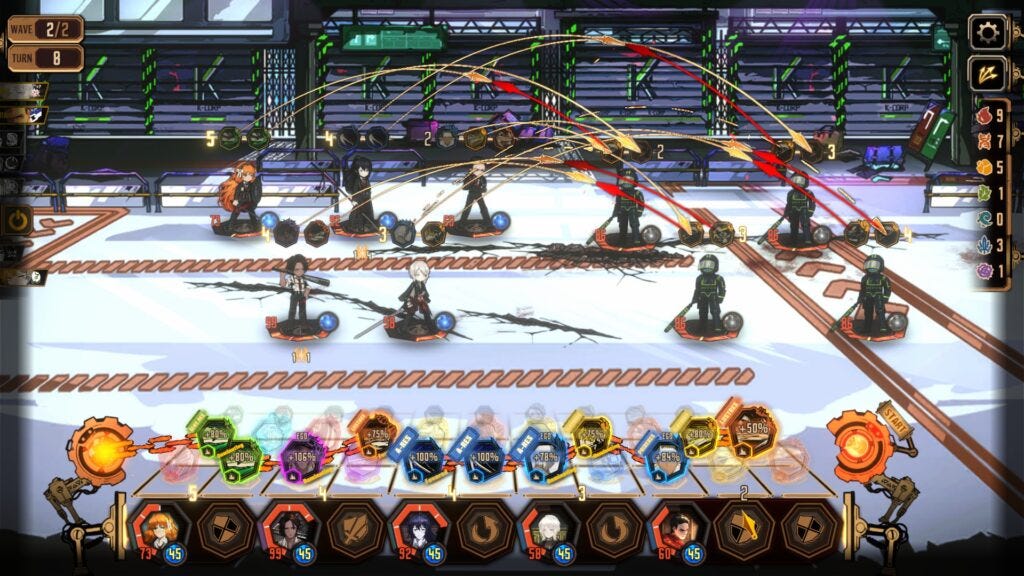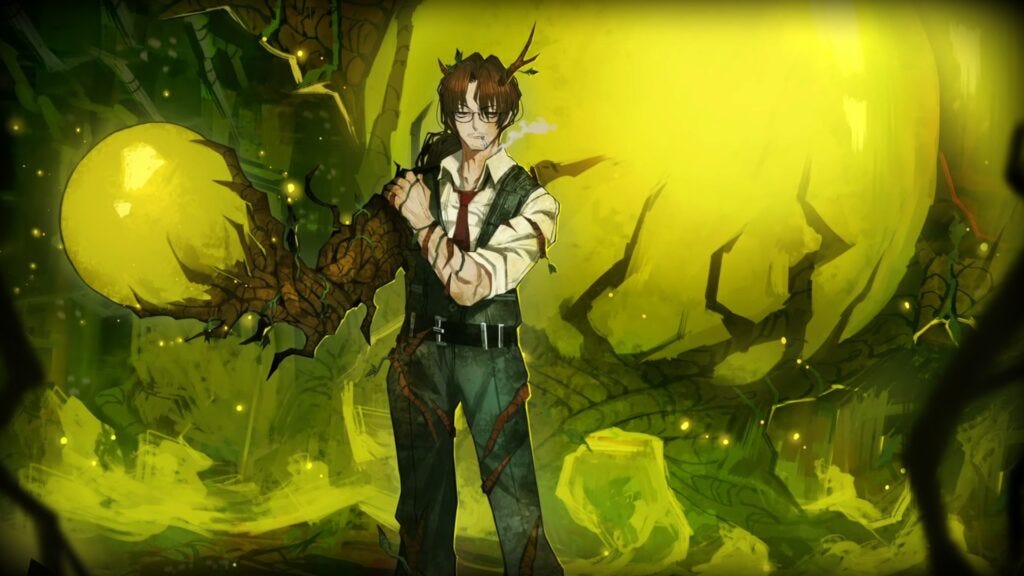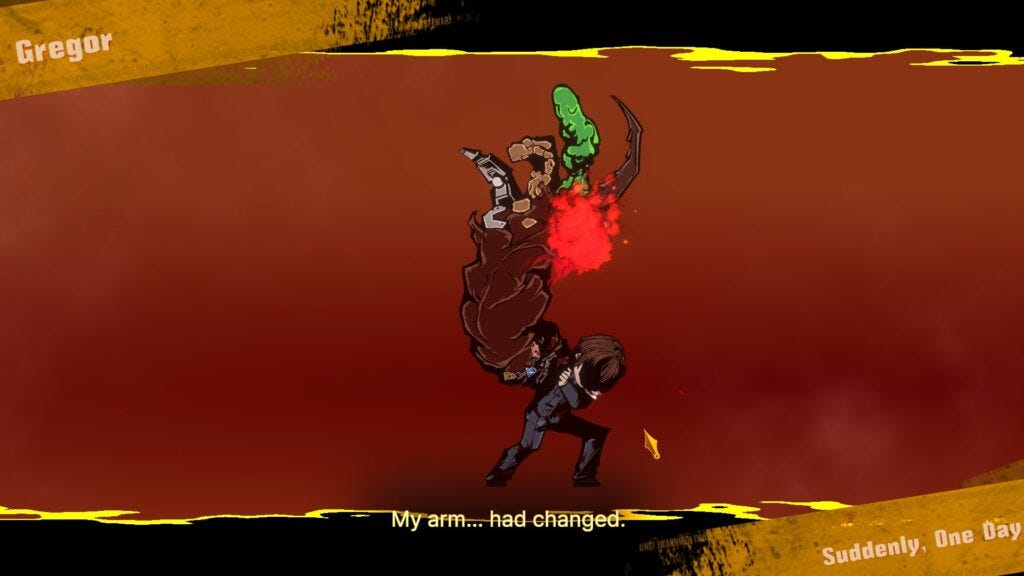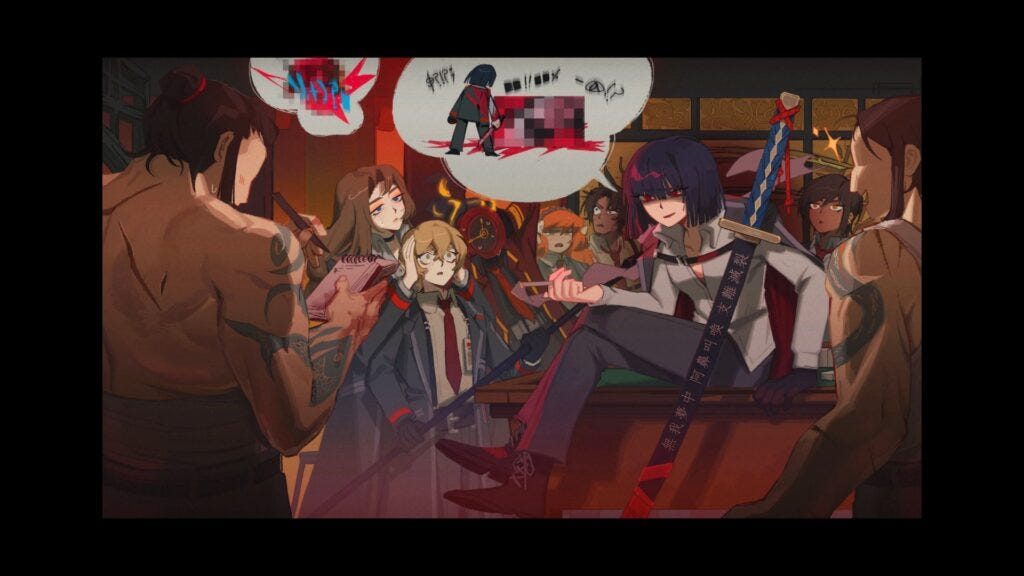Limbus Company Takes Project Moon to Gacha Corp
A gang to Gacha for

One of my most anticipated games for 2023 was the release of Limbus Company, the latest game from Project Moon whose previous games broke the trends of their respective genres and were some of my favorites. Now, the company known for creating really out-there concepts turns its attention to somewhere even crazier — the gacha mobile market. And while there are banners, gacha pulls, and a battle pass, this is still a Project Moon game first and foremost.
Going to Hell in a Bus
You play as the mysterious “Dante”, a person with no memory and a clock for a head. When you are about to be murdered by some strange people, you are saved by a bus belonging to Limbus Company and the 12 sinners who will be your allies into the inferno. As the newly appointed manager, it’s up to you to guide the crew across the city and its various districts to find golden boughs in the remains of Lobotomy Corp offices.
As per the previous games, Limbus Company’s story remains one of the strongest elements and is more of a direct sequel to the story and impact of Lobotomy Corp than Library of Ruina was. Here, you’ll get to see the fallout of the collapse of Lobotomy Corp, see what is happening in the city without the company there, and be exposed to more corps. Your partners are a very diverse and strange group of sinners — each with their own history and reason for joining the company.
Where things get interesting is how the gameplay works and how it is tied to the gacha system that Project Moon has set up.
Matching Murder
Like Library of Ruina, Limbus Company takes another gameplay genre and turns it on its head with a lot of complexity. Here, it’s all about matching colored symbols as you would in a puzzle or match 3 game. For each map, you’ll take a fixed number of characters into the field. Each character brings with them different skills that are categorized by their “sin” or color and the type of attack. In regular combat, you’ll simply draw a line from left to right to decide which attacks will be used for that round of combat. You want to match attacks and sin colors that are better against the enemy’s defense. Match either two same colors or three in a row, and those attacks will get a bonus value added when it’s time to calculate which ones connect.

Like Library of Ruina, combat is shown through clashes, with the higher value rolled from either the attacker or defender determining which move wins.
Besides that, you can set up characters to use one of three defensive moves based on the character chosen, and everyone gets super attacks, or EGO, that is charged by using the sin colors during combat.
This is just the tip of the iceberg, as characters get passive and support abilities, and the enemy fights escalate, which I’ll come back to in a bit. With that said, let’s talk about the gacha as I’m sure this is what a lot of you are wondering about.
Monetizing Multiverse
Limbus Company is still a gacha-driven game, but it reminds me a lot of Arknights in that you’re not directly pulling for more power, but for more options and tools to help you with the story. Unlike every other gacha game in existence, you’re not pulling for different characters — your group of 12 sinners is all that you have for the game’s life. Instead, you are pulling for multiverse identities of the character. In one version, a character could have gone to a different Corp, or maybe they became a professional assassin or a soldier. Regardless, each version of the character is ranked from 1–3 stars, with 3 being the best ranking.
Going up in rarity, the higher versions do have slightly higher base stats, but the real difference is in what skills and respective passives they can use. The other thing you’ll be pulling for at the same time is new EGO attacks. Each character can have up to five equipped with increasing power and utility, and you cannot pull duplicates of EGO attacks; once you have one, that specific attack is removed from the gacha system.
Progression is tied to leveling up characters, which impacts health, defense, and base damage. Ranking up the identity of the character unlocks additional passives and abilities, and upgrading EGOs gives them more impact and changes things further.

Now the big question that I know you’re all wondering — is this game pay to win (P2W)? Right now, I would lean towards no. At the end of the day, bringing the wrong characters to a fight, regardless of their rarity, will end in disaster for you. And like Library of Ruina, I can only begin to imagine what mid to late-game challenges in this game will look like, as someone who finished Ruina all the way to the true ending. Looking at the battle pass which is priced at around $10.87 USD, you get a lot of stuff for it and it runs for 80 days, far more than what I’ve seen in other games. There don’t even seem to be daily and weekly rewards in the same way as other gacha games. In those, you are required to log in daily just to get the free currency that you need. Here, all the rewards that you’re earning are tied to the season pass itself, so there is more of a long-term play to get the rewards as opposed to being required to play daily.
And long-term is where Limbus Company hits back hard if you’re expecting this to just be an easy mobile game.
When the Rubber Meets the Dungeon
Just like their other games, Limbus Company starts out laughably easy in its first chapter. The first 10 “official” levels in this game could very well be won playing the game blindfolded. And then the gloves come off, and you’re treated to what is considered the real challenge of the game. At the end of each chapter, instead of just fighting a boss, you are challenged to complete a dungeon, in roguelike style. You’ll choose various nodes to explore, try to gather essential EGO gifts as passive bonuses, and make your way to abnormality fights. These fights change up the combat and more closely mirror the battles in Library of Ruina. Not only will you have to target specific body parts on enemies, but you’ll need to try and catch enemy attacks from hitting exposed or weaken party members.
Then there are also mirror dungeons you can do up to three times a week that are completely randomly generated and are the best source of battle pass experience and gacha currency currently in the game.
If you weren’t paying attention to how weaknesses work and building effective parties, these boss fights will shut you down hard. Just like Library of Ruina, half the game is poring over your characters and their respective abilities to figure out how to win, and the other half is actually playing. This really isn’t a game where just grinding for more levels is going to help you as long as you are relatively close to the encounter level. Ranking up identities and EGOs will grant you more power, but require a specific resource that is limited to farming weekly.
A Busload of Problems
Limbus Company does have potential, but its launch has been marred by a lot of issues and questions about what’s coming. Performance issues on both mobile and PC have plagued fans. While they have fixed the ability to merge mobile and PC accounts for most players, it was certainly not a fun week 1 for fans and for Project Moon, and people are still reporting crashing and performance issues on phones at the time of writing.
From a UI standpoint, the game is struggling both with the complexity and depth of a Project Moon title and with the considerations made to make this fit on mobile. These games are already hard enough to learn, and the UI could use more information as to resources gained, and just what is actually happening when things get complicated with abnormalities. For me personally, on mobile, the icons are just a little too small for my big fingers that I sometimes can’t see what I’m touching or where an icon is while dragging. And for PC at this time, there does not appear to be any kind of shortcuts or really any additional functionality added to make use of the keyboard and mouse. Besides the larger screen, the other reason to play on PC is that the game runs much better unless you have a relatively modern smartphone.

But the two most pressing issues with the game at the moment from fans are content and how the gacha is going to be applied long-term. At launch, the game has three story chapters, with an unknown number to come in the future. You are now able to gain lunacy (the gacha summoning currency) by doing the mirror dungeon mode up to three times a week.
There is not only a lack of content to play, but even a lack of gacha at the moment. As you’re reading this, people are already coming up with tier lists and trying to break down the best characters to summon. Part of the balancing concern for a game like this is the very fact that enemies are designed to test you in terms of different builds and skills. If you don’t have characters who can counter the enemies or the right upgraded character, you are going to be in a world of hurt. I can tell you precisely when the game ramps up in difficulty in chapter 2, and when the difficulty spike happens in chapter 3. Like Library of Ruina, the game suffers when it comes to parsing what is going on. Unless you’ve been paying attention to the mechanics, you can go from winning every fight easily, to just getting destroyed on the very first turn with no explanation given.
No one quite knows just how powerful character identities and EGOs are going to get right now — the EGO attacks currently available only go up to 3 of the 5 planned power levels. Not only that, but EGOs apparently impact the respective character’s resistances which could also play a huge factor when the game starts to get more challenging. “Threadspinning” or ranking up EGOs and identities is the most important form of character progression and you will be limited in the amount that you can get each week.
Even with that said, the game will give you the normal versions of all the sinners and their respective EGOs fully ranked just for playing, and that can carry you for some time. Whether that can be used forever…I don’t know yet. Using the fully ranked up-base versions of the characters is arguably more powerful than a 3-star variant that hasn’t been ranked at all. I can say that with them, I was able to get through the difficulty spikes that occurred in chapters 2 and 3 and even beat the final boss of the chapter using mostly free characters.
At launch, there is no late or end-game content in Limbus Company, and while that is coming, it’s not good to release a mobile/live service game without anything to keep people invested in playing once they reach the end of the main content. Right now, the level cap for characters is at 30, which is admittedly really low compared to other mobile RPGs, and again, whether or not that will be the hard limit in the future remains to be seen.

Please keep in mind, as with any live service game, everything that I’ve talked about here is subject to change, including any new modes, different currencies, and so on. This is also why I’m very hesitant to talk about the game’s balance and design, as there is already system balancing being done and there is no guarantee that any issues or complaints will still be relevant by the time you are reading this.
(While writing this, Project Moon has released a roadmap for the game over 2023, and it does look like they have a comprehensive idea as to what will be added with short-term updates meant to reduce the grind and increase resource collection.)
A Golden Future?
With everything said, Limbus Company is quite an unusual game. While it is out for both mobile and PC, this does not play like other mobile gacha games. The end of chapter dungeons feels like a much more complicated game within an already complicated game, and that’s just the starting chapters. At this point, it’s hard to really say what the future looks like. Will we still be getting content and playing it two, three, or four+ years out? If this does have a story conclusion, will this be the rare mobile game that actually has an ending to it?
I see Limbus Company occupying a similar space as Arknights — a single-player, story and gameplay-driven mobile game that in one respect will have a hardcore following of fans wanting to support and keep the game going, but at the same time, be just a bit too advanced and out there to give it the mainstream explosion of success that games like Genshin Impact have had. Likewise, if you think whaling out is going to let you speedrun through this game, you and your wallet are going to be in for a rude awakening. If you’re someone who is wondering if this is where Project Moon has “sold out” and made a casual game for mobile, I can tell you with 100% fact that this is no “easy” game to play and the story is just as dark and disturbing as we all know and love from the studio.
If you’re already a Project Moon fan, you have already installed this and probably bought the battle pass by now. If you’re not a Project Moon fan and jumping into this as your first real exposure to them, it’s hard for me to say whether or not Limbus Company is a good entry point. At this moment, I think Library of Ruina is the stronger game, thanks to years of support and updates. If you’re someone looking for a game to actually play on mobile (or PC), where there is no idling and money is not going to replace skill, then this is a great game to check out. I will say that the real test of the longevity of Limbus Company is going to be where this game will be content-wise in the next six months and by the end of the year.
If you enjoyed this story, consider joining the Game-Wisdom Discord channel, it’s open to everyone.
For more thoughts on mobile and F2P games, be sure to check out my book on F2P Design
